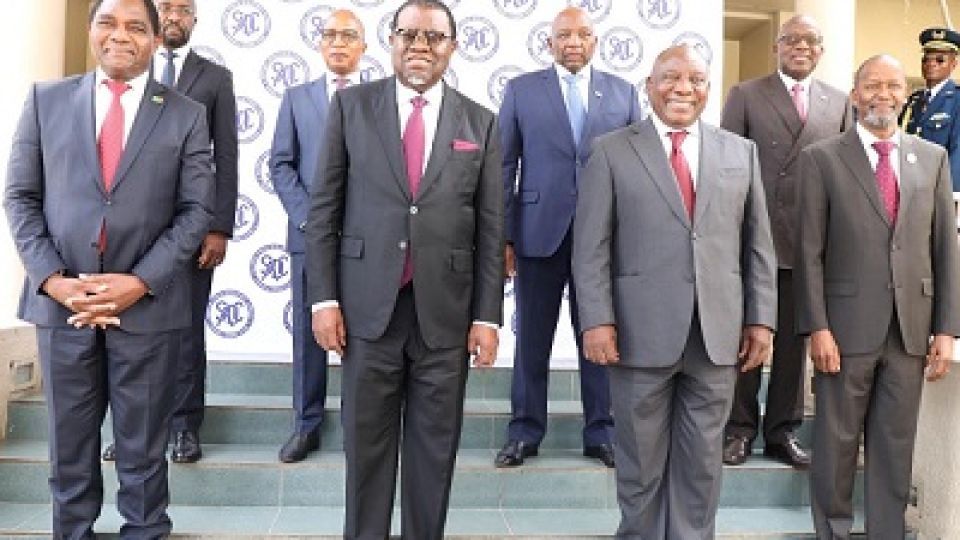from ALFRED SHILONGO in Windhoek, Namibia
Namibia Bureau
WINDHOEK, (CAJ News) – THE just-concluded Extra-Ordinary Organ Troika Summit of the Heads of State and Government of the Southern African Development Community (SADC) is an affirmation of this bloc yearning its status as a model of peace and stability in the continent.
For over four decades, the 16-member bloc has been the envy of fellow regional economic communities (RECs) that have eternally found peace elusive.
That was since SADC’s establishment in Zambia in 1980.
Then, it was the Southern African Development Coordination Conference (SADCC).
But conflicts have spectacularly soiled the bloc’s reputation.
SADC, on Tuesday this week, held an extraordinary summit in Namibia, prompted by escalating insecurity in the region.
Five heads of state and two officials that represented leaders of their respective countries attended the summit that ended with the issuing of a communiqué.
The countries represented were mainly those that are afflicted by conflict or those tasked by the bloc with finding solutions to these quarrels.
The meeting was a culmination of the ceaseless conflict in the Democratic Republic of Congo (DRC), the worsening crisis in Eswatini (Swaziland until 2018) and the deepening Islamist insurgency in Mozambique.
Zambia is the incoming Chair of the Organ on Politics, Defence and Security Cooperation. South Africa is the outgoing Chair. Namibia is the current Chair.
The situation that is deteriorating in Zimbabwe in the run-up to elections set for this year was deemed not tragic enough to be on the agenda in Namibia. This is a country that has been uneasy for over two decades.
It suffered a military coup in 2017 and violent elections a year later.
South Africa, the region’s economic and political powerhouse, is the scene of sporadic eruptions of deadly xenophobic violence. It is experiencing a spate of deadly mass shootings that resemble terror attacks.
Meanwhile, government-to-government relations between South Africa and Zimbabwe are intermittently and publicly hostile as South Africa bears the brunt of the crisis in its often defiant northern neighbour.
At the summit in Namibia this week, a moment of silence was held in honour of the SADC Mission in Mozambique (SAMIM) personnel who lost their lives in the line of duty since deployment in 2021.
Troops in the resources-rich but impoverished Mozambique are fighting Islamists that are wreaking havoc in the northern regions. The conflict has claimed an estimated 6 000 lives since 2017.
The summit reiterated the call for member states to urgently respond to requests for critical capabilities to enhance the operational capability of the SAMIM.
SAMIM itself lurched into controversy in January when a video circulated on social media purportedly showing soldiers throwing dead bodies onto a pile of burning household items.
The SADC summit said it noted the on (going) – investigations being undertaken by SAMIM leadership following the “disturbing.”
“The public will be informed once the investigations are completed, as communicated by the Chairperson of the Organ in his statement issued on January 11, 2023,” the SADC communiqué stated.
The summit noted with “deep concern” the unstable security situation in the eastern parts of the DRC and condemned the upsurge of conflicts and activities of armed groups, including M23 rebels, and the support provided to the armed groups by foreign forces.
The situation in the former Zaire is deteriorating, a worrying trend as the biggest country by size in the bloc, and second in the continent, is to hold elections later this year.
The summit resolved to initiate dialogue amongst the different RECs that have deployed forces in the DRC with a view to establish and implement mechanisms for the effective coordination of their interventions.
This is potentially the richest country on earth but conflict has rendered it arguably the poorest.
Eswatini, Africa’s last absolute monarchy, has been on the agenda of recent SADC summits but the situation keeps worsening.
The killing of leading human rights lawyer and political activist, Thulani Rudolf Maseko, is the latest twist in the tragedy.
At the end of the summit, SADC urged Eswatini to initiate the process of the national dialogue. It urged all stakeholders in the country to remain calm and participate peacefully in the process.
Protests have been ongoing since 2021.
SADC leaders are accused of the so-called quiet diplomacy, with a reluctance to hold each other accountable. This is in stark contrast to other RECs, for example the Community of West African States (ECOWAS), which expels member states who flout democracy.
Lesotho, beset by tensions until laudable elections late last year, was a breath of fresh air in the SADC summit whose agenda was dominated by crisis.
There were plaudits for the attending Samuel Matekane, the Lesotho Prime Minister, whose Revolution for Prosperity party won the polls in October, over six months after its formation.
The summit welcomed the commitment made by Matekane to prioritise the implementation and completion of the comprehensive national reforms process.
“This is a year to transform Lesotho into an independent state with the vision of being a self-sufficient country,” Matekane said.
The leaders that SADC has tasked with tackling the crises in the once peaceful region have pledged to find solutions.
“The time has come for us to dare, reinvent innovative strategies and pursue novel ways and means, to find lasting solutions to our political and security challenges,” Namibia President, Hage Geingob, said.
Zambia’s Haikande Hichilema concurred.
“We place peace and security top of our agenda because instability anywhere is instability everywhere. The citizens of SADC look to us to safeguard the peace and stability of the region,” Hichilema said.
The region of about 400 million people is at the same time battling the ravaging impact of climate change, unemployment and its worst energy crisis ever.
– CAJ News

